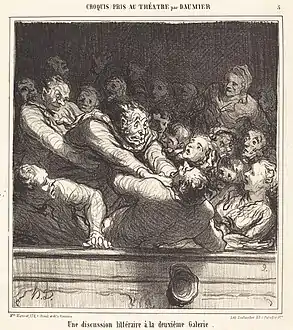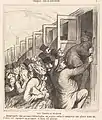Le Charivari
Le Charivari was an illustrated magazine published in Paris, France, from 1832 to 1937. It published caricatures, political cartoons and reviews. After 1835, when the government banned political caricature, Le Charivari began publishing satires of everyday life. The name refers to the folk practice of holding a charivari, a loud, riotous parade, to shame or punish wrongdoers.
 Masthead of Le Charivari in 1833, during its second year of publication. | |
| Categories | Humor magazine |
|---|---|
| Founder | Charles Philipon |
| First issue | 1 December 1832 |
| Final issue | 1937 |
| Based in | Paris, France |
| Language | French |
History and profile
Le Charivari was started by caricaturist Charles Philipon and his brother-in-law Gabriel Aubert to reduce their financial risk of censorship fines. They also had published the satirical, anti-monarchist, illustrated newspaper La Caricature, which had more pages and was printed on more expensive paper. In Le Charivari, they featured humorous content which was not so political. Ownership of the paper changed often due to issues with government censorship, and related taxes and fines.
Le Charivari published daily from 1832 to 1936, and then weekly until 1937.
In 1841, British wood-engraver Ebenezer Landells, together with Henry Mayhew, used Le Charivari as the model to establish their Punch magazine, subtitled The London Charivari.[1]

Selected contributing artists
Contributing with lithographs, woodcuts, and (after 1870) with zincographies (gillotage) were:
- Cham (Amédée de Noé)
- Honoré Daumier
- Alexandre-Gabriel Decamps
- Achille Devéria
- Gustave Doré
- Eugène Forest
- Paul Gavarni
- André Gill
- Alfred Grévin
- Grandville (Jean-Ignace-Isidore Gérard)
- Paul Hadol
- Alfred Le Petit
- Maurice Loutreuil
- Henry Monnier
- Louis Touchagues
- Gaspard-Félix Tournachon, known as Nadar
- Charles-Joseph Traviès de Villers, known as Traviès
Selected contributing writers
- Louis Desnoyers
- Louis Leroy
- Henri Rochefort
- Agénor Altaroche
- Philibert Audebrand
- Charles Bataille
- Clément Caraguel
- Albert Cler
- Taxile Delord
- Louis Adrien Huart
- Jaime
- Henry Maret
Illustrations in Le Charivari
 Lithograph of Victor Hugo by Honoré Daumier published 20 July 1849
Lithograph of Victor Hugo by Honoré Daumier published 20 July 1849 Lithograph by Louis Morel-Retz, published
Lithograph by Louis Morel-Retz, published
22 November 1869.jpg.webp) Caricature of Louis Philippe, published
Caricature of Louis Philippe, published
17 January 1834 Lithograph by Honoré Daumier published
Lithograph by Honoré Daumier published
27 February 1864 Lithograph by Honoré Daumier published 1864
Lithograph by Honoré Daumier published 1864
References
- Thomas Gretton (1997). "European Illustrated Weekly Magazines, c. 1850–1900" (PDF). Anales del Instituto de Investigaciones Estéticas. Retrieved 28 November 2014.
"Le Charivari". H. Daumier and His Lithographic Work. Retrieved 7 May 2005.
External links
- Honoré Daumier exhibition, Masterworks fine art, archived from the original on 15 June 2006, refers to Charivari.
- "Le Charivari", Gallica (digital library), FR: BnF.
- Daumier Drawings, an exhibition catalog from The Metropolitan Museum of Art (fully available online as PDF), which contains material on Le Charivari (see index)